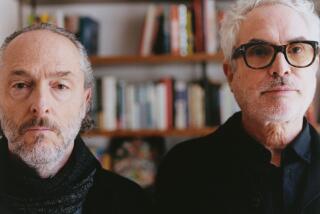FILM : ‘Nazarin’ Faithful to Bunuel’s Art
- Share via
Religion, specifically the Roman Catholic Church, has often been a touchstone for Luis Bunuel. What separates Bunuel from lesser directors is his ability to face personal questions about Roman Catholicism directly, without resorting to either simple-minded reverence or snide superiority.
Most of his films have religious undercurrents (predictable for an artist who spent much of his creative life in Mexico, a country known for its intense devotion to Catholicism) and a few are courageous in their frankness. For instance, “Viridiana,” the 1961 film that follows a novice nun as she encounters a world of eroticism and suffering outside the cloister, deals with the church’s fallibility in a temporal world.
Then there’s “Nazarin,” in some ways Bunuel’s bravest movie. Released in 1959, it updates the story of Christ, reinventing him as Father Nazarin (Francisco Rabal), a selfless priest living in Mexico at the turn of the century.
“Nazarin,” screening Friday night as part of UC Irvine’s “Double Vision” series, is a parable that looks at Christian idealism and comes up with ambiguities that seem right for contemporary times--in one stroke, Bunuel praises the purity of faith, worries about its role in the modern world and condemns the church’s hypocrisy that he believes has done much to subvert it.
Nazarin is a strong symbol of what undiluted faith can create. He’s a moral paradigm, a man who lives only to give and create a simple environment for worship. Nazarin helps many people, but Bunuel keeps the focus on two women, the unhappy but good-hearted Beatriz (Marga Lopez) and the passionate hooker, Andara (Rita Macedo).
Both mean trouble for Nazarin, despite his best intentions; it’s his naivete and, ironically, his innocence that do him in. After Andara accidentally implicates him in a murder, the three take to the road. The priest becomes Bunuel’s version of Christ, preaching his gospel along the way and, unwittingly, causing violence. Eventually his own spirituality is questioned.
The last scene, when Nazarin is reduced to an absurd martyr unable to protect himself through his faith, is one of Bunuel’s most beautiful.
A critic once made the point that Bunuel was a “pure” filmmaker, one whose thoughts and emotions were transferred to celluloid elegantly without the seams of deliberate craft.
It has something to do with instinct, not study. The directors who move us find a connection that has nothing in common with calculation, but is based on emotion and all its attending ambiguities. That’s why Bunuel’s “Nazarin” can be so moving--it never feels less than honest.
What: Luis Bunuel’s “Nazarin.”
When: Friday, Feb. 28, at 7 and 9 p.m.
Where: UC Irvine’s Student Center Crystal Cove Auditorium.
Whereabouts: Take the San Diego (405) Freeway to Jamboree Road and head south. Go east on Campus Drive and take Bridge Road into the campus.
Wherewithal: $2 and $4.
Where to Call: (714) 856-6379.
More to Read
Only good movies
Get the Indie Focus newsletter, Mark Olsen's weekly guide to the world of cinema.
You may occasionally receive promotional content from the Los Angeles Times.










